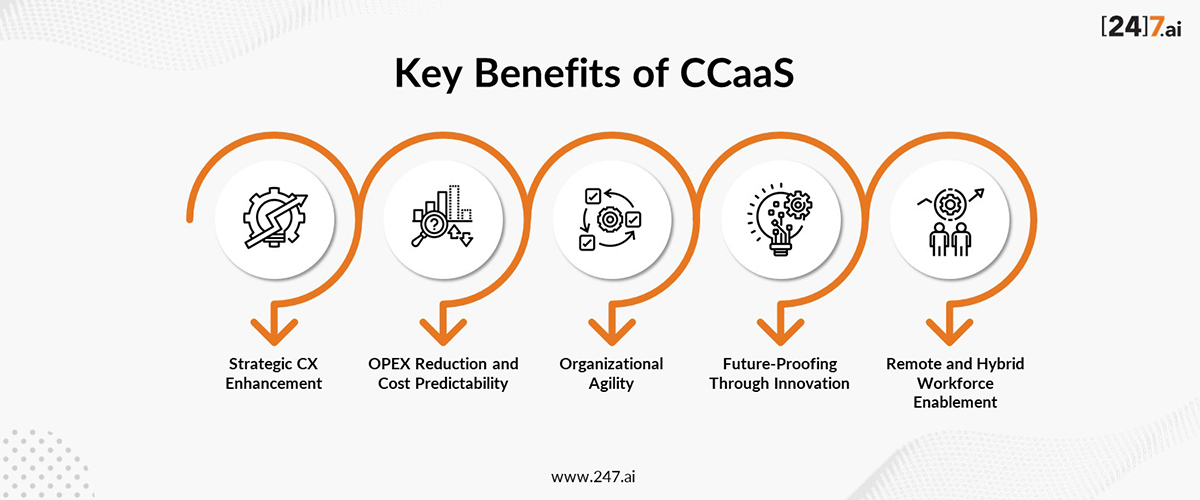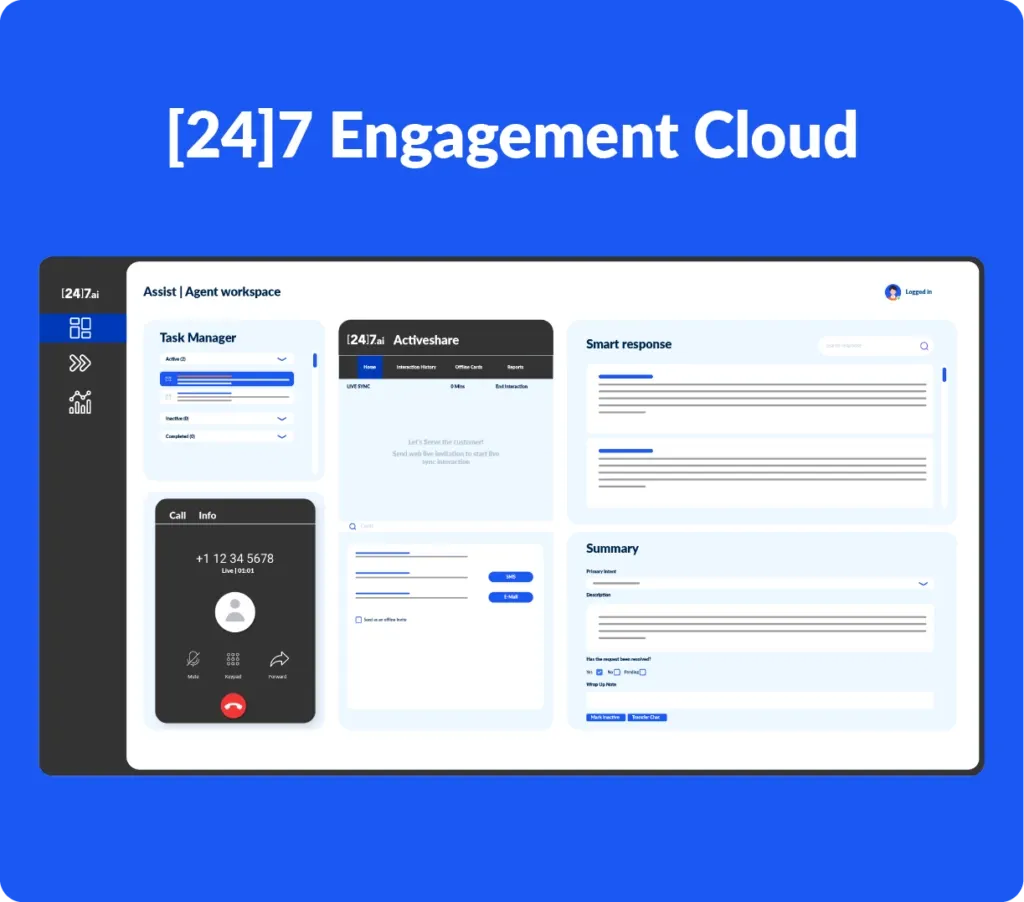Table of contents
- Introduction
- Redefining the Contact Center: What is CCaaS?
- An Intelligent Engine: Key Features of a CCaaS Platform
- The Mechanics of Modern Engagement: How Does CCaaS Work?
- Strategic Value Realized: Benefits of CCaaS
- Who Should Use CCaaS?
- [24]7.ai: Amplifying CCaaS with AI-Led Orchestration
- Summary: Beyond Channels, Toward Strategic Engagement
- FAQs
Customer experience (CX) has evolved from a support-centric role for contact centres to a strategic role for enterprises. Today’s digital-first customer demands customer-centric, hyper-personalized, real-time interactions across platforms. Enhanced personalization directly impacts revenue outcomes, with 49% of consumers reporting impulse purchases.
Contact Center as a Services (CCaaS) enables businesses to provide seamless, cross-channel, AI-driven customer experiences. This blog post explores the foundational architecture of CCaaS, how it works, the key functionalities, and how CCaaS can fundamentally transform the architecture of the modern contact center.

Redefining the Contact Center: What is CCaaS?
The transition of call center software from legacy hardware systems to cloud-based, omnichannel platforms has culminated in the rise of CCaaS. At its core, CCaaS is not a product, but a catalyst for customer-centric transformation.
This flexible, cloud-native platform powered by AI replaces fixed and location-based infrastructure. Enterprise organizations can leverage CCaaS to unify voice, chat, social, and self-service in a single, integrated environment.
More than a delivery model; CCaaS is an architectural intelligence of real-time automation, contextual continuity, and instant scaling. It enables organizations to proactively adapt to changing demand and accelerate innovation in customer experience.

An Intelligent Engine: Key Features of a CCaaS Platform
Contemporary CCaaS platforms offer modular and feature-rich architectures designed to streamline complex customer engagement workflows. Here are some key features of CCaaS:
- Omnichannel Interaction Management: This includes a unified orchestration layer for all customer touchpoints (voice, chat, email, SMS, social, and in-app) that includes context of work, intelligent routing, in-flight handoffs between channels, and agents.
- AI and Automation Engines: By using robotic process automation, smart IVRs, virtual agents, and natural language processing (NLP), it handles large volumes of inquiry calls, manages low-priority calls and drives improvements in first-contact resolution.
- Real-Time and Predictive Analytics: It offers predictive modeling and very detailed information for continuous enhancements to the consumer experiences.
- Workforce Engagement and Optimization: Includes WFM, quality management, and performance analytics to match your agents' schedules with demand forecasting. It facilitates data-driven training changes and proactively detecting operational inefficiencies.
- Elastic Scalability and Global Reach: Dynamic provisioning delivers fast ramp-up or ramp-down operations through cycles of operations. Delivery through the cloud will offer business continuity, organizational robustness, and geo-distributed agent enablement.
- CRM and Ecosystem Integration: APIs and pre-configured connectors facilitate agile, seamless integration with CRM, ERP, case management and industry-specific systems. This enables a unified perspective of customer data drawn from disparate sources and supports the creation of meaningful, automated workflows.

The Mechanics of Modern Engagement: How Does CCaaS Work?
CCaaS platforms function as an integrated stack of cloud services that replace or augment traditional contact center infrastructure. The operational flow typically includes:
- Cloud Infrastructure Deployment: It is hosted on public or private cloud environments, offering high availability, disaster recovery, and compliance with global standards such as GDPR, HIPAA, PCI-DS, etc.
- Channel Abstraction and Unification: All customer engagement channels are standardized through a single UI/UX layer, allowing agents and supervisors to manage omnichannel
- Intelligent Routing & Workflow Automation: Advanced algorithms route interactions based on agent skill, customer intent, historical data, and business rules. Workflow engines automate backend tasks to streamline resolution.
- Human-AI Collaboration: Bots handle Tier-1 interactions with seamless escalation to human agents for complex needs. Agent assist tools offer real-time recommendations and contextual knowledge.
- Continuous Optimization Loop: Interaction data is ingested into analytics engines that provide actionable insights, support coaching, and inform CX strategy through performance benchmarking.
Strategic Value Realized: Benefits of CCaaS
The revenue of the global CCaaS market is projected to reach USD 23.6 billion by 2032, as it continues to deliver multi-dimensional value across operational, financial, and strategic domains.
- Strategic CX Enhancement: CX strategy provides personalized and proactive experiences that align with your brand promise and customer journey
- OPEX Reduction and Cost Predictability: Move from a CAPEX-rich infrastructure to a consumption-based model to achieve significant reduction in operational expenses (OPEX).
- Organizational Agility: Accelerate the rollout of new services, channels, and regions and allow for almost quick response to market developments.
- Future-Proofing: Through Innovation Get Access to behavioral routing, conversational AI, and voice analytics without interruption or platform switching.
- Remote and Hybrid Workforce Enablement: Empower a location-based workforce with secure, browser-based agent desktops and real-time supervisor controls.

Who Should Use CCaaS?
CCaaS is a strategic fit for any business looking to modernize its customer engagement, with the Banking, Financial Services, and Insurance (BFSI) sector leading the way by accounting for 25% of the total CCaaS market share. The Ideal adopters include:
- Enterprises with Global CX Footprints
- Digital-First Organizations
- Startups and SMBs
- BPOs and Outsourcing Providers
[24]7.ai: Amplifying CCaaS with AI-Led Orchestration
[24]7.ai differentiates itself by fusing AI-first design with enterprise-grade contact center capabilities and creating intelligent, context-aware customer journeys.
- Conversational AI + Human Synergy: Natural language bots resolve inquiries autonomously, while Agent Assist ensures seamless transition to human agents with full context continuity.
- Omnichannel Orchestration Engine: Streamlines all digital and voice interactions through a unified engagement hub, ensuring personalized, consistent experiences across every touchpoint.
- Predictive Engagement & Behavioral Insights: Real-time behavioral analytics and journey mapping predict intent and proactively engage customers with timely, relevant assistance.
- Measurable Business Outcomes: Clients leveraging [24]7.ai’s CCaaS platform report reductions in average handle time (AHT), increases in NPS/CSAT, and savings in total cost of operations.
Summary: Beyond Channels, Toward Strategic Engagement
The Contact Center as a Service is more than just a technological innovation. CCaaS has become an indispensable business strategy in today’s customer experience-driven economy. CCaaS allows enterprises to leverage staff and technology to address evolving consumer demands with smarter, faster, and quicker service.
Whether you’re looking to grow your support operations, investigate AI automation, or boost remote agent productivity, CCaaS can provide the infrastructure and intelligence you need to stay ahead of the curve.
Need to future-proof your contact center with smart automation and AI-powered customer engagement?
Discover [24]7 Engagement Cloud’s capabilities and see how you can leverage them to drive efficiency, boost customer satisfaction, and scale effortlessly.
Frequently Asked Questions
Most CCaaS platforms provide APIs and pre-built connectors for seamless integration with legacy systems, CRMs, and enterprise apps, ensuring unified workflows without major overhauls.
CCaaS providers ensure security with encryption, role-based access, and compliance with GDPR, HIPAA, and PCI-DSS standards.
While CCaaS depends on internet connectivity, many providers offer redundancy, offline modes, or mobile access to ensure business continuity during outages.
Absolutely. CCaaS solutions can be customized with industry-specific modules, workflows, and integrations to meet unique requirements.
Modern CCaaS platforms offer multilingual support and smart routing, enabling localized service for global audiences.



